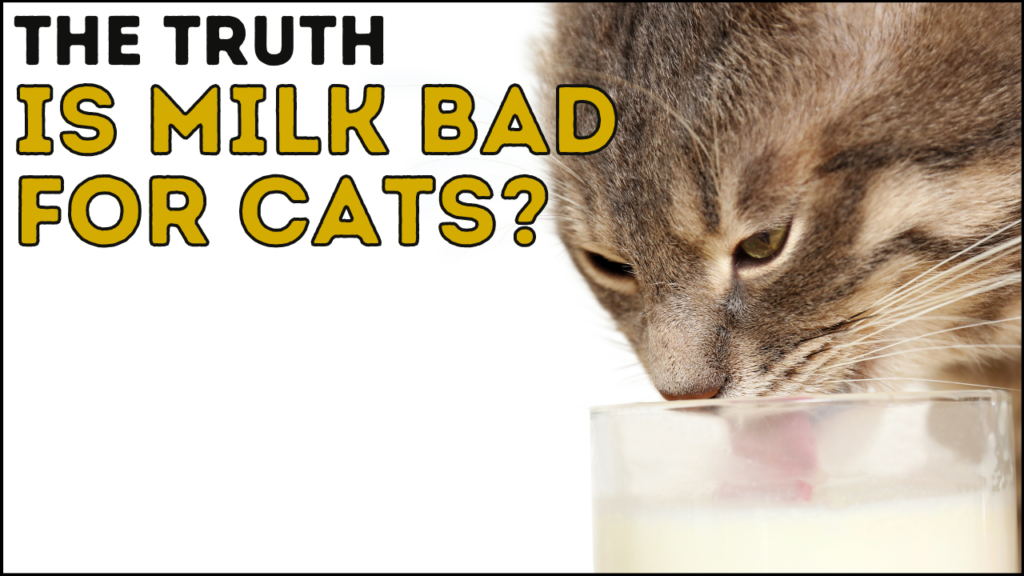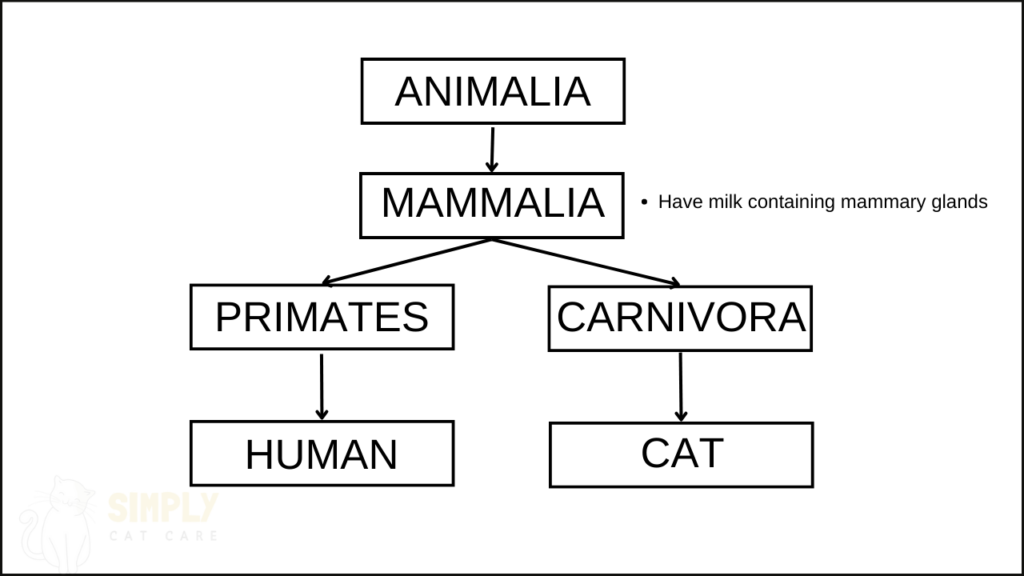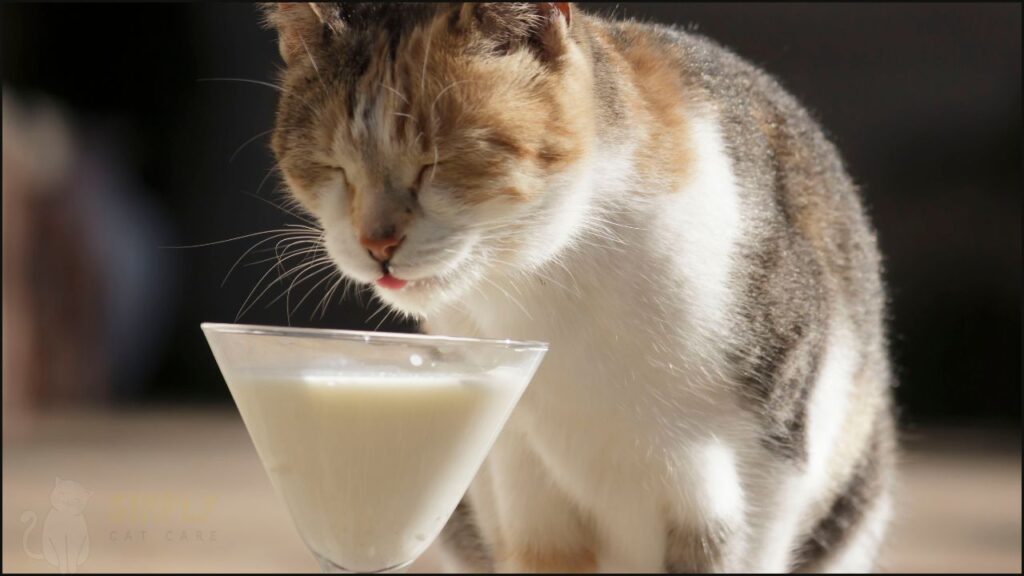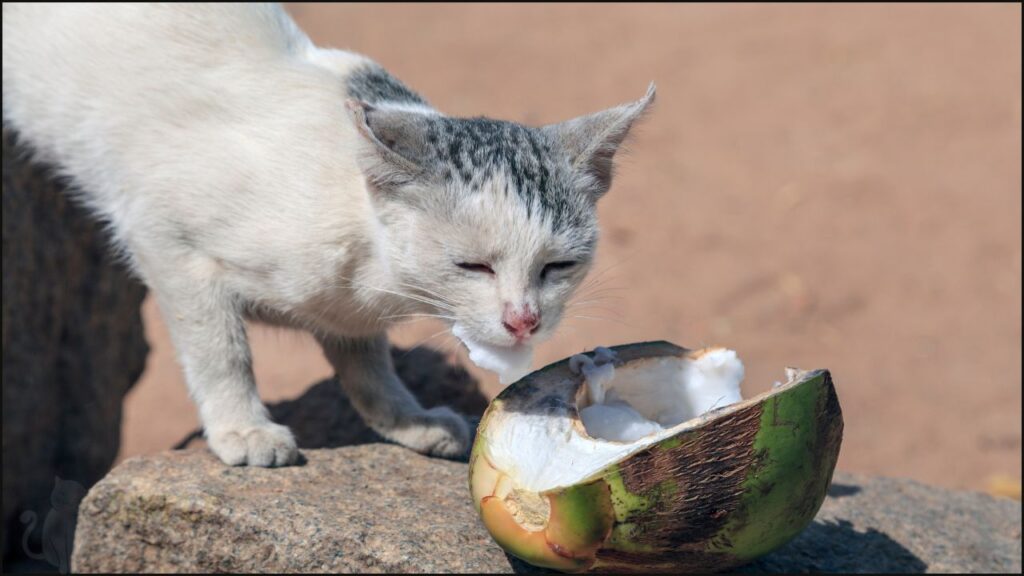Is milk bad for cats?
No.
Adult cats can drink 130 ml milk a day without digestive upset. This is 1/2 cup of milk.
Milk contains lactose, a poorly digested sugar. Too much milk can cause diarrhea.
In the rest of this article I’ll look at benefits and drawbacks to milk drinking in cats. I’ll also cover frequently asked questions.
I am not a veterinarian and I recommend seeking the advice of a vet for any further questions. This article is not intended as a replacement for medical advice.
Let’s get into the article.

Is Milk Bad For Cats?
No.
Adult cats can drink 130 ml milk per day without harm.
Cows are a primary source of milk. In 2021, 226 billion pounds of milk was produced for US consumers.
All mammals produce milk. Their offspring drink it for rapid growth.
As you’d expect, milk is nutritious.
Per cup, milk offers:
- 149 kcal
- 8g fat
- 8g protein
- 12g sugar
The protein is rich in essential amino acids. Milk is also high in calcium, an important mineral for bones and teeth.
Kittens suckle for up to 25-28 days and without a teat may try to chew on littermates.
So what’s the issue?
The sugar lactose.
Lactose Intolerance
Lactose is the sugar in milk.
It’s a disaccharide molecule. That’s two sugars linked (glucose and galactose).
To digest lactose, these two sugars break down with lactase enzyme.
Cats are mammals, like cows and humans. The main feature of a mammals are mammary glands for milk production.
Kittens suckle milk for up to 4 weeks of age until weaned off. The mothers milk contains lactose, which kittens can digest.
Lactase enzyme reduces in adulthood, similar to humans.
Less lactase = less digestion of lactose.
If lactose isn’t digested, it’s fermented by gut bacteria, causing diarrhea.

Can Cats Drink Milk?
Yes.
Cats can tolerate 6g/MJ of lactose sugar in milk. This equates to 130 ml of milk per day (1/2 cup).
Cats enjoy milk, particularly whole fat milk.
Milk is a valuable nutrition source for cats. It’s rich in fat, protein, water, and micronutrients.
Feral cats steal milk from lactating elephant seals.
Avoid excess milk.
Increasing the milk over 130ml will overload your cats ability to digest lactose.

Do Cats Have Milk Allergy?
Very rare.
Milk allergy accounts for only 0.01% of all allergies in cats.
That doesn’t make it impossible, but unlikely.
An allergic reaction to milk will include skin-related issues (e.g. scratching excessively) and digestive upset (e.g. vomiting).
Diagnosis of allergies involves vet examination and an elimination diet.
Can Cats Eat Cheese?
Yes.
Cheese removes the curds from the whey. This eliminates most of the lactose sugar (and whey protein) from cheese.
Less lactose = less digestive upset.
The problem is cheese is calorie dense. Excess contributes to weight gain.
Related:
Benefits to Giving Your Cat Milk
Milk offers the following benefits:
- Hydration
- Protein
- Calcium
- Fat
Cats need 1 cup of water per day. They can tolerate 1/2 cup of milk.
Milk as well as meaty broths are a great way to encourage hydration.
There are no negatives as long you don’t give your cat too much.
Downsides to Giving Your Cat Milk
Downsides include:
- Weight gain
- Digestive upset
- Allergy (very rare)
Cats gain weight with excess calories. Factor calories from milk.
Diarrhea occur with high intakes of milk (>1/2 cup). Some cats may have less tolerability.
Start small, and check tolerance.
Allergies are very rare. Rare doesn’t mean impossible, though.
Many possible causes of allergies exist, so check with a vet.
Frequently Asked Questions
How Much Milk Is Toxic to Cats?
Milk isn’t toxic to cats.
Cats can tolerate 130 ml of milk without digestive upset.
Why Do Cats Like Milk So Much?
Milk is nutritious.
It’s high in essential amino acids, fat, and water.
For survival purposes, this represents a highly valuable food source for cats. They even steal it from seals.
The casein protein may have anxiolytic (anxiety reducing) properties.
What Kind of Milk Can Cats Drink?
Cows milk.
Cats can tolerate 130 ml per day. This equates to 1/2 a cup.
Is Almond Milk Okay for Cats?
Probably not.
Almond milk is low in protein, and high in carbohydrate.
It doesn’t offer any benefit to cats.
Is It Ok to Give Cats Milk Once in a While?
Yes.
Cats tolerate 130 ml of milk a day. This equates to 1/2 a cup.
What Can Cats Drink Beside Water?
Meaty broth.
Oxtail soup or bone broth are tasty alternatives to water.
What Happens if My Cat Licks Milk?
Nothing.
Cats can tolerate small amounts of milk without harm.
What Can’t Cats Eat?
A range of plant based foods.
Cats lack the liver processes to detoxify some plant compounds.
Learn More:
Can Cats Drink Milk Mixed With Water?
Yes.
As long as the total milk portion doesn’t exceed 130 ml your cat can tolerate the drink.
Is It Ok to Give Cats Oat Milk?
Not recommended.
Oat milk is low in protein and high in carbs. This isn’t ideal for cat nutrition.
Can Cats Drink Coconut Milk?
Not recommended.
Coconut milk is low in protein.
Coconut milk is high in fat from medium chain triglyceride. Cats are averse to the taste of these fats.

Conclusion
Cats can drink up to 130 ml of milk a day.
Cows milk contains lactose. In high amounts, cats struggle to digest this sugar, causing diarrhea.
I recommend small amounts of milk in your cats diet to help with hydration but mind the extra calories.
Allergies from milk are rare in cats. Speak with your vet for more queries about milk.
